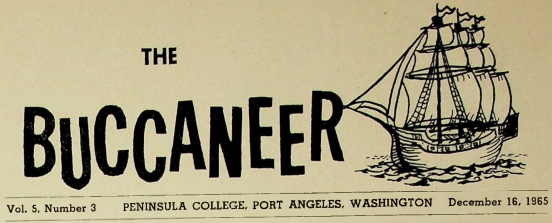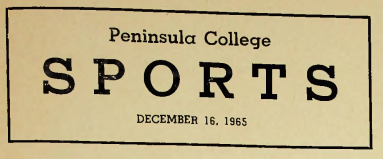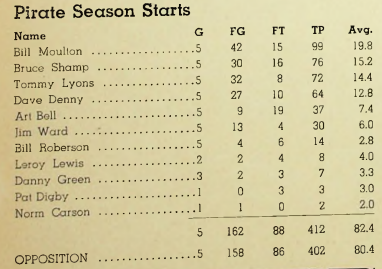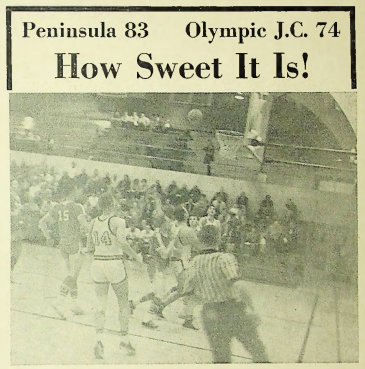
Nursing Students Move to Campus
The Nurses Training Course offered by Peninsula College has recently moved from the
YMCA building to one of the rooms on the new campus. Mrs. Thelma Barnes is instructor for
the class.
The course is based on an 11- month program which includes 18 weeks of pre-clinic or classroom study. In addition to the vocational training, anatomy and psychology are important
areas covered in the pre-clinic study.
A specific number of hours must be spent on each of the areas covered in the course.
An outline of the various areas and the number of hours
spent on each is given below:
I. General Patient Care
a. Nursing Procedures
180 Hours
b. Physical and Menial
Health 5 Hours
c. Medical and Surgical
Nursing 45 Hours
d. Pediatrics 15 Hours
e. Geriatrics 20 Hours
f. Rehabilitation 10 Hours
g. Emergency Nursing
10 Hours
h. Medications 60 Hours
i. Communicable Disease 10 Hours
e. Anatomy and Physiology
50 Hours
3.Nutrition and Diet, 30 Hours
4. Personal and Vocational
Relations 30 Hours
5.Care of Mother and Newborn
20 Hours
6.Psychiatric Nursing, 10 Hrs.
The nursing student must spend an additional 120 hours of elective subjects chosen from such areas as X-Ray and Retardation.
The class is limited to 16 students who were required to take aptitude tests al the Washington State Employment office.In February, about the second week of that month, thestudents will begin their workin the hospital.
circle K to Aid in Canned Food Drive
Peninsula College Circle K Club members will aid the local chapter of the Salvation Army December 18 and 19 during the Army’s week long canned food drive. The canned food will ge to the country’s needy families.
Although the drive is scheduled to continue throughout the
entire week of December 13 through 19, the Circle K will have its members officially aiding in the collection of cannedgoods only during the final two days of the drive because of quarter exams occuring the same week.
The club members participating in the drive will pair off and go from house to house asking for donations of canned food.
The pair bringing in the largest quantity of canned goods will win a prize of ten dollars.
“The Circle K Club is a service organization of the college.”
“The importance of being earnest. ”
Peninsula College’s first play for the year, “The Importance of Being Earnest,” by Oscar
Wilde, was performed on Friday December 10 and Saturday, December 11. Because the theatre has not
yet been completed, the cast performed in the library in an open-arena style. Open-arena
is done on the same level as the audience and there is no curtain-drop. Set changes, if
any, are done in the presence of the audience. In many ways this style is beneficial. It has a
tendency to make one feel as though he is in the room and among the characters in the
play.
Scene one takes place in the morning room in Algernon’s flat in Half Moon Street. The setting
was simple but artistically furnished in aqua and white. The characters in their order
of appearance in the play are: Lane was played by Michael
Dilley, Algernon’s distinguished butler. He is arranging afternoon tea on the table. In the adjoining room we hear the sound of a piano. After it has ceased Algernon, played by
David Starnes, enters in his usual nonchalant manner. Algernon’s main interest appears
to be food and drink. Mr. Jack Worthing, played by Larry Watson, with his witty remarks and
clever imagination, sets out to win the heart of the Hon. Gwendolyn Fairfax, Kathy Burke “a
girl brought up with the utmost care” and who is nearly always accompanied by her mother, Lady Bracknell, played by Danna Britton. Her main concern is the social status of her
most esteemed family; Cecily Cardew, played by Julie Hoffman, portrays a sweet, innocent
girl who dislikes studying of any nature. She is Mr. Worthings ward and is governed by
the strict Miss Prism, played by Cynthia Bialek.
It is quite apparent to the audience that the old Miss Prism has clearly decided to
catch “Dear Doctor Chausable,” the rector of Woolton Rev. Chausable was played by Toby Hastie. There was just one other set change. The draped, aqua backdrop, signifying a curtain was replaced with a backdrop of flowers, signifying that the scene changes to a garden. The furniture was simply rearranged in accordance to this.
The play was directed by Mr.Kearns who has a tremendous amount of acting and directing skill. Representative of the plays in which he has appeared are, “The Importance of Being Earnest,” “Twelfth Night”,
“Brigadoon”, “My Fair Lady”, and “Pajama Game.” Approximately $76.00 was taken in for the two night stand.
This will more than cover the expenses of the production so all the play was a success.
Assistant io Mr. Kearns was Miss Pamela Ward. Others who had a hand in the production were: tickets and set construction, members of speech 100 and English 142 classes; furniture, courtesy of Angeles Furniture; and costumes, designed by Mrs. Sarah James.
Mr. Kearns hopes to begin work on the next production at the beginning of February.
It will be presented in our new theatre in the spring.
Landscaping Dedication
Members of the Olympic Peninsula District of Federated Garden Clubs were among those present at the dedication of the new shrubs on campus held on December 7. Mrs. J. Gordon Gose, past president of the National Council of State Garden Clubs was honored at the ceremony for many contributions to city, state and national beautification programs. A plaque was placed near the library honoring Mrs. Gose. Mrs. Gose has participated in many national and local organizations including: member of the Century Juniors of the Federated Women’s Clubs; past president of the Seattle Orthopedic Guild; member of the Semad Club, Women’s University Club, Faculty Wives of the University of Washington and the Arboretum Foundation. Her name appears in Who’s Who of American Women, and the Dictionary of International Biography published in England.
Mrs. Gose made a brief speech to the audience.
A substantial donation from the Olympic Peninsula District of Federated Garden Clubs has been used in the landscaping of the college.
Following the dedication of the shrubbery planting, everyone was invited into the library for coffee and cookies. Hostesses were AWS representatives.

the dedication of the shrubbery planting at Peninsula College
Tuesday afternoon
P.C. Receives Accreditation
Last month Peninsula College came under the scrutiny of the accrediting committee of the Northwest Association of Secondary and Higher Schools. As a result of their two-day investigation, this school is now fully accredited for the coming three years.
A letter received December 7 from F. L. Stetson, secretarytreasurer of the NASHS, stated:
“Dear President Maier: At theannual business meeting of the Northwest Association of Secondary and Higher Schools . .the following recommendation from the Commission on Higher Schools was unanimously approved: Peninsula College: Accreditation for a period of three
years, subject to a progress report in 1967. It is a pleasure to give you official notice of this action and to congratulate you and your staff upon this initial approval. The period of accreditation is from the beginning of the current year, 1965-66.”
Upon receiving this notice, President E. John Maier commented, “Initial accreditation may be for a period of from one to five years; schools that have been previously accredited may be granted a ten-year period of time. We feel very fortunate in having received the threeyear period. Il will be necessary for us to submit a progress
report in 1967, which must show progress in the areas mentioned by the Commission in their report.
Recommendations include expansion of the vocational-technical program to provide separation of the high school and col1 e g e vocational students, a counselor who has had training in the field of vocational-technical education, and the formation of an Advisory Committee
to aid in the expansion of the program.
It is recommended that those staff members who have quite heavy administrative loads along with teaching duties make a decision soon as to the area in which they should expand their energies. It was also suggested that the college should budget according to the various departments, and that the requirements for the Associate of Arts degree be somewhat increased.
Winter Quarter
Registration for winter quarter will be held on December 21 and 22. The majority of the sophomores will register on Tuesday, with Wednesday designated primarily for freshman registration. Registration appointments have been assigned, and can be found posted on the bulletin board in the student center or in the office. All students are urged to come at the appointment times. It is also suggested that students have a fair idea of what courses they are interested in taking and the time they want to take them.
Course lists for many fields of study can be found in the Peninsula College catalogue. Registration may be inconvenient
for some students, but it is the same for the advisors. Try to attend at the time appointed to you.
Holiday Tourney
The Peninsula College Pirates will host the Holiday Invitational Tournament which will be held December 28 and 29 at the high school gymnasium.
The Pirates will play Shoreline on the opening night with Big Bend and Skagit Valley squaring off in the night final. The second night will have the two winners meeting for the championship. The losers will play for third place. Peninsula, with a 3-2 win-loss record, will have the services of Jeff Decker which should give the Pirates better shooting, defense and rebounding. Skagit Valley and the Pirates rate as favorites, having already split a twogame series played earlier in the year. Shoreline has yet to win this season, and Big Bend is an unknown quantity.
Phi Theta Kappa Style Show
Phi Theta Kappa held its Christmas Fashion Show on Tuesday December 7, 1965. The theme was that of “Elegance”, a quite appropriate theme. The fashions of elegance were courtesy of Adel’s
Dress Shop. The Fashion Show was held at 8:00 at the Elks Ballroom. Models included:
Nikki Lundberg, Sheryl Parks, Glenda Landry, Betty Shinn, Peggy Owens, Kathy Burk, Sharon Meyer, Ann Smith, and Mrs. Morrish. The cochairmen of the event were Nikki Lundberg and Judy Read.
‘Peace on Earth; Goodwill towards men . . ‘
How vain it sometimes seems to believe that love and goodwill
can win over the organized hate and evil power that is in our
world today.
The world today is full of problems, hate, and fear. Situations
in troubled spots like Viet Nam and the Dominican Republic make
the picture look grim. And violence isn t a problem in only national affairs. Right here in our own country, crime has proven
to be a growing worry. It s no longer safe for women alone to go
out at night. And these are only a few of the many, many problems which are continually growing in the world around us.
The Christmas season has come upon us, and once again, the
dream of peace on earth is here. Is this a dream impossible to
come true? Is it possible that some day, perhaps in the near
future, we will be able to spend a Christmas in complete peace?
Christmas is a symbol of hope. A baby was born on Christmas
day nearly 2,000 years ago in Bethlehem. The world, at that time,
was troubled too. But the people didn’t claim that the world situation was hopeless. Instead, they dreamed big dreams—dreams to
build on.
Neither is the world situation today hopeless. Even in our
crowded, impersonal world, every bit of individual influence can
contribute toward peace. Impossible as the situation may seem,
we can gather hope and courage and set out to establish peace.
So what will this Christmas bring? Maybe things won’t be
running too smoothly this Christmas, 1965, but there is still a
chance that we may have, someday . . . peace on earth.
P.J.
It will be Christmas in Viet Nam, and the war is kind enough
to close its mouth while eating the world whole. It is ironic that
the unknown soldiers of this war receive many of their gifts wrapped in the Sunday funnies. Here, along with the familiar carols,
we hear an increasing number of ”message songs.” Such sentiments as contained in songs like “Eve of Destruction,” “Universal
Soldier,” and others are mostly windblown. William Faulkner
said it better in his acceptance speech for the Nobel Prize:
“Our tragedy today is a general and universal physical fear
so long sustained by now that we can even bear it. There are
no longer problems of the spirit. There is only the question: When
will I be blown up? Because of this the young man or woman
writing today has forgotten the problems of the human heart in
conflict with itself. He must learn them again. He must teach
himself that the basest of all things is to be afraid; and, teaching
himself that, forget it forever, leaving no room in his workshop
for anything but the old verities and truths of the heart. Until
he does so, he labors under a course. He writes not of love but
of lust, of defeats in which nobody loses anything of value, of
victories without hope and, worst of all, without pity or compassion. His griefs grieve on no universal bones, leaving no scars.
He writes not of the heart but of the glands.”
“Until he relearns these things, he will write as though he
stood alone and watched the end of man. I decline to accept
the end of man. It is easy enough to say that man is immortal
simply because he will endure; that when the last ding-dong of
doom has clanged and faded from the last worthless rock hanging tideless in the last red and dying evening, that even then
there vzill still be one more sound: that of his puny, inexhaustible
voice still talking. I refuse to accept this. I believe that man
will not merely endure; he will prevail.” • D.S.
“Culture means reading, not idle and casual reading, but
reading that is controlled and directed by a definite purpose.
Reading, so understood, is difficult, and, contrary to an almost
universal belief, those who can do it are very few.”
—Albert Jay Nock
“I disapprove of skimming. The least you can do for a
serious piece of writing is read it. I try to read every single word,
and, frankly, it is an exhausting business. But that’s just the
point—reading is, or should be, an active process, not a passive
one.” —Norman Podhorelz
Wilde Play is Excellent
By CANDY ROSS
“The importance of Being Earnest”, the witty Oscar Wildecomedy, was presented December 10 and 11 in the Peninsula College library. The three-act play, written in the nineteenth
century, has been amply reviewed by now, so I will not go over it here, but instead concentrate on the actual performance.
Considering the relative inexperience of the cast, the presentation was excellent. There were a few fumbled lines in the Friday night performance, but they could be written off as first-night nervousness. In any case, an adequate recovery was made, allowing the play to proceed fairly smoothly. Larry
Watson, as Jack, alias Ernest, gave a really believable, interesting performance. His voice was changed enough from its normal tone to give a hint of an English accent, which added
reality to his portrayal. Kathy Burk was also convincing as Gwendolyn Fairfax, Jack’s fiancee. She actually seemed to be the self-centered daughter of the domineering Lady Bracknell. That lady was played by
Danna Britton, who was startling in the change from her “real-life” character to that of the pompous, overbearing Lady Bracknell. David Starnes portrayed Algernon Moncrief, Gwendolyn’s cousin and Jack’s brother. He played the gluttonous Algernon with a low-key calmness and detachment that was refreshing. Julie Hoffman
acted the part of Jack’s youthful, high-spirited ward, Cecily, with enjoyable sincerity. Miss Prism, Cecily’s prudish governess, was competently played by Cynthia Bialik, as was the Reverend Canon Chasuble by Colin Hastie. Max Lewis and Michael Dilley gave good performances as the two butlers, Merriman and Lane.
The costumes used in the play were wonderful, each helping to bring out the personality of the character. Necessarily hampered by lack of a stage or formal set, the players received, in one case, active assistance from the audience in changing the scene between acts. What set there was was artfully used to add as much atmosphere as possible. All in all, the play was well enough presented to be enjoyable and entertaining, rather than trying or boring, as sometimes happens in amateur productions.
Book review: Edward Warrant
Edward Lewis Wallant died in 1962. In the last three of his thirty-six years, he produced four novels which equally possessed the bang and brilliance of a first novel; the awe that moves a reader to say, “This would make a good movie.”
Without labelling them, Wallant was a trafficker of characters whose common ground
is one of suffering. If they are unable to move beyond it, they at least in the end assume a more dignified and distinct bearing. Ordinary people still prove to be the most extraordinary. In his first novel, The Human Season, the main character is a plumber; in another it is a landlord, or a pawnbroker or a hospital orderly. In all the main character is also the pain sufferer. Like an unwilling Maypole, he stands rooted and wrapped in the multi-colored guilts and wounds and little deaths of those around him.
These colors clash, then blend with his own suffering. In Montaign’s words then, each character in this color scheme “bears the whole stamp of the human condition” — and he grins from that bearing.
There is a religious element in these novels which doesn’t smack of religiosity. Each of the central characters is Jewish (as Wallant was) and in The Children at the Gate he is obviously a kind of Christ. The Pawnbroker is a man embittered and haunted by memories
of Nazi Germany and nightmares of the concentration
camps. The most likeable sufferer, and at first the weakest, is the landlord in The Tenants of Moonbloom,, who finally displays the same good of Wallant’s other heroes: sacrifice
and compassion. It is a pity that Edward Wallant did not live to write more. It will be a greater pity if what he did write does not survive.
If he had one thing to say, perhaps it is stated by Sol Nazerman in The Pawnbroker: “If a person is capable of such fearful imagination that each time a creature is beaten he feels the pain himself, then I have reason to feel safe with that man. Your brave men, and your compassionate lovers, are dangerous. No, give me the spineless undedicated ones with the quivering, morbid imaginations, those selfish enough to constantly project themselves into any act of brutality; I can hold my own with them.”
D.S.
Letter to the Editor . . .
Dear Editor:
The students of Peninsula College are losing their rights in student government. The simple reason—they fail to exercise them.
A few weeks ago, just that happened. The students did not live up to their responsibility.
The issue involved is not as important as the resolutes. Because the student failed to set standard student policy, the administration of this college had to step in to protect the interest of the school.
Can you blame the administration? The answer is no. The blame rests squarely on the shoulders of each individual student.
Why are the students to blame? The reason is simple: you as students did not make your opinion on this issue known to your elected representatives on the Board of Control. As the Sophomore Representative, I try to vote in the best interest of the college and the
students I represent. Without your cooperation, the other members of the Board of Control and I will have to vote as each individual member sees the issue. This is in some cases, not in the best interest of the students.
I would welcome any opinions on problems presented before the B.O.C. If you are unable to see me or one of your other representatives, come to the meeting and voice your views. This is your right. Let’s keep our student government active and in the best interest of the students. Respectfully yours,
Curtis Achziger
Book Review: Pigeon Feathers
“John Updyke? Never heard of him.” And so go the comments of our students about the works of an author who has been called “. . . The most gifted young writer in America . . and “. . . one of the best of our younger writers.”
The author of Rabbit, Rim,The Centaur, and The Poorhouse Fair has also had book of nineteen short stories published called Pigeon Feathers and Other Stories. Seventeen of these stories were originally published in the New Yorker. Pigeon Feathers … is a book to be kept under one’s pillow and perused in the silent, sleeping-roomate hours, for one or two readings will not suffice in the struggle for understanding. Each story is a carefully balanced, polished, complete unit.
There is no untidiness or slapdash message-sending in Updike, but a concern for the minute, the mundane, the memorable which makes each word count.
“A & P” is characterized by the humorous, sensitive checkout boy, Sammy, who quits his grocery store job because the store manager insults three girls who have come in the store in bathing suits. He rushes out to find them, but they are gone, leaving him alone with his chivalry—and his unemployment.
Ben, the small boy who goes to the carnival with fifty cents in “You’ll Never Know, Dear, How Much I Love You,” learns how “the world, like a bitter coquette, spurns our attempts to give ourselves to her wholly” when one of the barkers gives him back forty of his fifty cents that he has willingly lost. The tender boredom of marriage comes through in “Walter Briggs,” “Wife-Wooing”, and “The Crow in the Woods” with almost embarrassing clarity.
The love of the Updike husband for the Updike wife is realistic, commonplace, and considerate. “Flight” and “A Sense of Shelter” are truthful searches through the hearts and minds of high school boys, their painful growth and naive egotism.
It has also been said of Updike, “He writes so beautifully. I just wish he could find something to say.” If there is one consuming thought in Updike’s stories, it is not to let life slip away by allowing trivialities to be unimportant.
Pigeon Feathers . . . wakes one up to a new view of America, marriage, used cars, cheerleaders, children, dirt, baseball games, and pigeons. It is a valuable book, not only because the author holds some startlingly different views, but because it leaves a great deal unsaid. One starts to think on one’s own to find a greater message than “pay attention to the small” that is not beyond common man to express.
John Updike’s very caution prevents him from saying something larger than he has at this time.

Sport- Scope
By Butch Ludke
Football
ihe Cleveland Browns wrapped up the eastern division of
the National Football League weeks ago, but the western division is still up for grabs among three teams. If Baltimore should
still pull out, the Browns would repeat as NFL title-holders, but
should either Green Bay or Chicago win, Cleveland will find the
task much more formidable. The NFL crown should rest back in
the west once the issue is finally decided.
The Rose Bowl-bound Bruins from UCLA were -dumped down
in Tennessee by the basketball score of 37-34 to the Bluebonnet
Bowl-bound Vols. With a penetrable defense such as that, the
Bruins shsould be no match for number-one-ranked Michigan
State in Pasadena January 1. Gary Beban of UCLA will make
it interesting, however.
The Arkansas Razorbacks, unbeaten in their last twenty-two
games, will down the Louisiana State Bengals from Baton Rouge
in the Cotton Bowl, and probably by a large score.
Missouri’s Tigers look too strong for Florida in the Sugar Bowl,
while unbeaten Nebraska should edge the Crimson Tide of Alabama in the Orange Bowl.
Skimming over the minor bowls in a hurry, it looks like
Texas Tech over Georgia Tech in the Gator Bowl, Tennessee
over Tulsa in the Bluebonnet Bowl, despite the record-breaking
combination of Billy Anderson to Howard Twilley, Mississippi over
Auburn in the Liberty Bowl, and Texas Christian over Texas
Christian over Texas Western in the Sun Bowl.
Boxing
The only note-worthy fight during the past month, aside from
Muhammed Adi’s predicted victory, was Emile Griffith’s defense
of his welterweight crown over a back-pedaling Manny Gonzalez in fifteen dull rounds.
Ali did exactly as he said he would. He punished Patterson
and then knocked him out, even though it was of the technical
variety. Ernie Terrell appears now to be his only obstacle to
complete dominance of the heavyweight division. Terrell should
be no competition for champ Muhammed either.
Basketball
The Duke Blue Devils exploded the myth of UCLA’s invincibility on successive nights last week, and so with only two weeks
gone in the collegiate basketball season three of the big four—
UCLA, Michigan, and Duke—have already dropped contests. The
only unbeaten really strong team is now St. Joseph’s of Philadelphia, the team that Sports Illustrated picked to win it all this
year. Speaking of this magazine, they came out with a four-page
spread last week on “How to Beat the UCLA Press.” Evidently
Duke subscribes to SI.

“Catch Us If You Can” – Pirates
Riddle—What’s the difference between the DC-Five and the PC-Five? — About ten inches of hair
and also the fact that one plays “Catch Us If You Can” on guitars and the other plays it on the
basketball floor.
The PC-Five, the Peninsula College Pirates’ starting quintet, have adopted the hit by the
DC-Five, Liverpool s Dave Clark quintet as their personal theme song this year and three of the
Pirate s first five opponents have not been able to meet the challenge successfully.
The pressing, running, shooting Pirates opened their thus far successful campaign at home and
dumped the visiting Rangers from Olympic J.C. 83-74 as the losers couldn’t solve the newly-inno- voted Pirate zone press. Head man Bill Quennette has put the press into use for the first time this year because he felt he had The type of personnel that could react fast enough to handle this sort of assignment. Johnny Wooden’s pressing tactics have brought him t w o successive NCAA (National Collegiate Athletic Association) championships at UCLA and thus the press, in different variations, has sprung up around the country on all levels of basketball.
However, this type of defensive offense seems suited to the Pirates’ pattern of play as Olympic, Skagit Valley and lower Columbia have all found out.
Peninsula’s season record heading into the Christmas Tournament is three and two
as a result of splitting two game stands in their last four outings with the Cardinals from Skagit
Valley at the opening of the year and the Red Devils of Lower Columbia down in Longview
last week-end.
Two sophomores and two freshmen are leading the Pirates in the scoring department thus far, although the scoring over the entire year has been pretty well distributed, something every coach likes to see. Carrying the bulk of the offensive load though have been sophomore veterans Bill Moulton, 6-6 center, and deadlyshooting Dave Denny, 5-9
guard. Freshmen learning the ropes fast are Bruce Shamp, a 6-3 forward and speedy 5-10 guard Tommy Lyons. Denny and Sharp cavorted for the Port Angeles Roughriders in high school, and both of them attained all-league status. Moulton and Lyons hail from Seattle,Bill from Lincoln and Tom from Blanchet. Art Bell of Port Angeles has added mightily on both offense and defense, as have Jim Ward of Federal Way and Bill Roberson from Yakima’s Davis High School. Panny Green of Port Angeles has looked good when he has played, as have Pat Digby, Leroy Lewis, and Norm Carson. Gary Haakenson, Ray Berg Sonny Sacapanio, Dan Peacock, and Jeff Decker round out the Pirate basketball squad.
The Pirates will face stern competition when they host the Christmas Holiday Basketball Tournament at the end of the month in Port Angeles. Skagit Valley, who the Pirates have split with in two attempts, will be the favorite on the basis of having two of their walking wounded being returned to action. Art Adams and Dennis Calhoun, who saw limited or no action against the Pirates previously, will be ready to go by then. Both are outstanding basketball prospects and should lead the Cardinals through the tourney easily if they are healthy and at full speed. After the
tournament here t h e Pirates wait until January 7 and 8 when they travel to Grays Harbor to battle their powerful junior college team in a pair of games.
The Christmas tourney also marks the final home appearance of the Pirates until the first
of February when they host the junior varsity of the University of Puget Sound.

held the usually high-scoring Rangers to seventy-four points.

off floor following opening game triumph over Olympic J.C.
Holiday Tourney
The Peninsula College Pirates play host to three visiting junior
college teams in the first annual Christmas Holiday Basketball
Tournament December 28-29.
On Thursday the 28th, Big Ben J.C. from Wenatchee battles Skagit Valley’s Cardinals
at 6 p.m. in the high school gym to open the two-day action.
The Pirates test Shoreline J.C. in the nightcap. The losers of the first two
games start play on Friday night with the two winners battling for top honors in the finals.
Trophies will be awarded to all four teams competing at the
completion of the tournament. Skagit Valley will be decided favorites to walk off with the biggest one.
The Peninsula College Bookstore will repurchase textbooks
from the students on December 17 and 20. A list of textbooks to be repurchased will
be posted in the Snack Bar
and in the Bookstore.


Academic Programs offered
Applications for four undergraduate programs in Europe were offered to students until
Friday, December 10, according to their sponsor, the Institute of European Studies, in Chicago.
Located in Freiburg, West Germany, and in Madrid, Paris and Vienna, the programs emphasize liberal arts and social science studies at the sophomore and junior levels. The institute also conducts full academic-year programs in all four locations, as well as in Nantes, France.
In Freiburg, students take the regular courses of the University of Freiburg, a 400-year-old
institution whose faculties have included such scholars as Erasmus and Martin Heidegger. Applicants must have junior standing at least B averages, and two years of college German
or equivalent ability.
Students in the Madrid program select courses from curricula organized under the direction of the university’s faculty of political and economic sciences. All instruction is in Spanish. Requirements include junior or sophomore standing, a C-plus average at least, and
two years of Spanish.
In Paris, the institute has formed a special spring program emphasizing accelerated development of skills in French, together with studies in other fields. Courses are taught in
French by French university professors. Sophomores applying for the program must have
three semesters of college French, and juniors five semesters. All must have averages
of at least B.
The spring program at the University of Vienna offers English-taught courses in a wide
variety of fields, intensive German language training, and opportunities for enrollment in
regular German-taught courses of the university. One semester of German and an average
of at least C-plus are required of sophomores and juniors admitted to this program.
The institute’s full-year program in Nantes is the first generally offered for undergraduates majoring in engineering and mathematics, and also adm its students majoring in
French literature. No spring program is conducted there.
Comprehensive fees for the programs, including tuition, room, most meals transatlantic transportation and field trips, range from $1,605 to $1,750 for
spring programs, and from $2,405 to $2,760 for full-year programs.
Students are housed in private European homes or, occasionally, in European student dormitories. Sailings are set for about Feb. 1, with return in mid-summer.
Further information can be obtained from the institute, at
35 E. Wacker Drive Chicago.
Final Exams Now Underway
“I’m sorry, I can’t—I have to
study for finals!”
“Finals—ugh!”
Sound familiar? Probably for
fall quarter, finals have dropped suddenly on Peninsula College. The library is rapidly becoming more and more crowded as deadlines draw near and
the student center seems to be
losing even its most rigid members.
Remaining finals this quarter will be held according to
this schedule:
Thursday, December 16—
1st period classes 8-10 a.m.
5th period classes 1-3 p.m.
Friday, December 17—
2nd period classes 8-10 a.m.
6th period classes 1-3 p.m.
Monday, December 20—
4th period classes 8-10 a.m.
8tn period classes 1-3 p.m.
Mr. Mooney, college librarian, has announced that the library will be open all week.
It will also be open on Monday
and Thursday nights from 7 until 9 p.m. The library has a seating capacity for 125 students.
Mr. Kearns Shows Interest in the theatre
Mr. Kearns centers his life around the theater. He not only
instructs the drama department and leaches several classes at
Peninsula College, but he also stays an active member in the Port Angeles Community Players group here.
He is instructing French 101; speech 101 and 140; and English 142 (drama) at Peninsula
this year. Kearns came to Port Angeles after having taught in Jordan, Montana and Moorehead, Minnesota. This is his first year of instruction al Peninsula College.
Why did he choose to instruct at this particular college? Mr. Kearns . explained that in the
first place, he likes this part of the country. Also, since Peninsula is a relatively new institution, he feels that he will be able to develop a theater here.
Mr. Kearns was reared in Miles City, Montana, and he attended the University of Montana in Missoula. An active member of a summer theater in Montana, Kearns worked as Assistant Director and Company Manager there.
Although the theater has proven to be his main interest, Mr. Kearns is also enthusiastic about automobiles—mainly antiques and classics, that is. “I also enjoy writing,” he added.
“I like it” was his quick reply when asked how he feels about Peninsula College.
He pointed out that Peninsula is different from the other colleges he is familiar with. His
past experiences have been with much larger institutions. He explained that, although
Peninsula is still quite small and offers a limited program, it seems to be making sure
progress. As he puts it,”Peninsula seems to be growing in the right direction.

College. This tree, placed in the student center, was decorated
by the sophomore class. The Circle K decorated the tree outside
on the court yard.
From the Crows Nest
By GARY DELGUZZI
Mr. Crawford is looking toward the completion of the
new lecture hall so he can show his mountaineering class climbing techniques.
Monday morning the workmen stood around the campus looking in amazement at the snow that covered the grounds. It is really strange that everyone is taking to studying during the first quarter finals of the year. (Especially the freshmen).
Notice how everyone was saying how pretty the. snow was on Monday morning but cursing it under their breath as they walked to and from the PUB (Pirate Union Building).
Jim Manders, John Stark, Dave O’Sullivan, and Gary DelGuzzi enjoyed a good old fashioned snowball fight early this week. Hear the latest? Mr. Fisch carries an umbrella now!
Looking around downtown Sunday night, one could see quite a few college students watching the great Port Angeles fire. . . There were also a few that were helping direct the firemen by Olympic State Bank . . . Steve, Sam, Margaret, Kathy, Gary, Mary. All the students at Peninssula College wish to extend their sympathy to those who suffered loss during the fire Sunday night.”Sadness is having a quarter exam al 8 o’clock Monday morning.” I hear there were quite a few nursing students with stiff arms after their lesson in using crutches. Enough said.
C.W.S.C. and W.W.S.C visit
Representatives o f Central Washington State College and Western Washington State College were on campus to meet with prospective students of the schools they represented on November 22 and 24. The purpose of the meeting was to acquaint students with the schools policies, admittance requirements, and fees. Mr. Bridges and Mr. Davidson represented CWSC and Mr. Carl Mathews represented WWSC. The representatives from CWSC plan a return visit on January 31 from 10 a.m. until 3 p.m. so they can have another opportunity to talk to students interested in that college.





